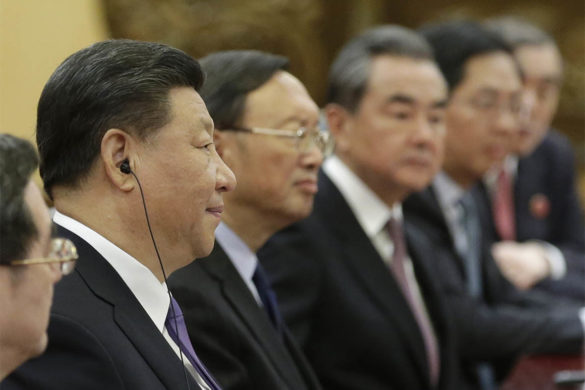
Death by paperwork: Tariffs aren’t China’s only trade weapon
Here’s how China could cause pain to American businesses without resorting to tariffs.
By ADAM BEHSUDI
Tariffs may cause sticker shock and send stock markets swooning, but the Chinese have an even bigger arsenal of economic weapons to hurt the U.S. businesses as the trade wars escalate.
Beijing could take a death by regulation approach making it nearly impossible for American businesses to operate in one of the world’s valuable consumer markets. Actions include tighter customs procedures, new paperwork requirements and extra scrutiny on business licenses. The government could also scrutinize visas, making it harder for U.S. business travelers to enter the country.
Another way Beijing could hurt the U.S. is by appealing to Chinese patriotism by pushing its population to boycott U.S. products and prominent brands like Apple.
These aren’t just speculative ideas. Both Chinese state media and social media outlets reveal a population ready to fight alongside its leaders in the economic war against President Donald Trump and the United States.
“Any cursory reading of social media and public commentary in China at present clearly shows that a nationalistic pressure by civil society in China is building rapidly,” said Craig Allen, president of the U.S.-China Business Council.
Allen, whose group represents major U.S. companies doing business in China, said the Chinese government has tried to reassure American investors that their interests should be protected and there have been no obvious cases of retaliation.
“Let’s hope it stays that way,” he said. “We should all be extremely cautious about stirring up anti-American sentiment in the second largest market in the world.”
But if the trade fight proliferates, China could quickly deploy many of these non-tariff actions in a bid to exert leverage. China has far fewer U.S. imports to hit with duties compared to the amount of goods that China exports to the U.S.
Harsher rhetoric from Chinese officials in recent days has hinted that Beijing could be weighing its options for how to hit back against a decision by the U.S. to increase existing tariffs and impose new penalties on all remaining Chinese imports.
Chinese President Xi Jinping warned in a speech on Wednesday that one civilization forcing itself on another would be “stupid” and “disastrous.”
A Chinese foreign ministry spokesperson said that China would “fight to the end.”
“That’s always been their secret weapon, so called non-trade barriers,” said Michael Pillsbury, an outside adviser to Trump on China issues. “The non-trade barriers are where you can really inflict damage.”
China’s central government may have an interest in trying to keep any non-tariff responses firmly under its control for now. Boycotts and similar mass movements against U.S companies would not only damage Chinese business interests but could quickly morph into social unrest aimed at the government, said Deborah Elms, executive director of the Singapore-based Asian Trade Center.
“This would be playing with fire,” she said.
Instead, the Chinese government could ramp up “qualitative” actions that can remain firmly under its control. That could include tightening customs inspections, delaying regulatory approvals, invalidating patents, and other actions drawn from a playbook that Beijing has consistently relied upon in years past.
China could also try to interfere with U.S. company supply chains. For example, it could inspect Apple iPhone supplier Foxconn’s production facility and find violations to justify shutting them down for three months.
“Given the rate that Starbucks is expanding in China, my guess is the Chinese government will discover something that‘s not quite right,” said Elms.
Beijing could also try to undermine the impact of U.S. duties by letting the value of its currency slide, although that could bring larger problems it may want to avoid.
“These are not surgical tools,” Elms said. “If I want to inspect the paperwork of a company, I can control that pretty well. When you start messing with currency, that effects the entire economy.”
For U.S. businesses, the calculus has changed as many companies now view China’s growing middle class and 1.4 billion consumers as their primary market where they now build and sell products.
With a middle class of 300 million people and growing, multinational companies like Boeing and General Motors are looking at futures more closely tied to China — where demand for aircraft and automobiles is expected to outpace the U.S. in the coming years.
It’s unclear if the pain of U.S. businesses in China will resonate with a president whose ultimate goal may be to decouple the U.S. and Chinese economies.
“I don’t think [Trump] will want to hear directly from all the Dennis Muilenburg’s of the world,” a former senior U.S. official who was posted in China said, referring to Boeing’s CEO. “If enough of them call, that might get his attention.”
Source: https://www.politico.com/story/2019/05/15/us-china-tariffs-1446100